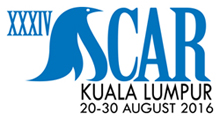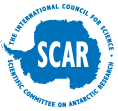The 2016 Open Science Conference of the Scientific Committee on Antarctic Research (SCAR) will be held in the Kuala Lumpur Convention Centre, Kuala Lumpur, Malaysia from 22-26 August 2016. The conference theme is Antarctica in the Global Earth System: from the Poles to the Tropics.
Session S34 Footprints in Antarctica, and Antarctica’s Footprint: Perspectives from History is being organised by Cornelia Lüdecke (Germany), Victoria Nuviala (Argentina) and Peder Roberts (Sweden) of the SCAR History Expert Group who provide the following description.
“The history of human presence in the Antarctic is both long – dating back nearly two centuries – and diverse, including sealers, whalers, tourists, and military personnel as well as scientists. Their footprints were both literal and metaphorical. For some the Antarctic was a treasure trove of scientific data, for others a harsh and unromantic place of work. Many left documentary traces (books, reports, diaries, and more), while others left material remains that can reveal unwritten stories, or function as sites of cultural heritage. At the same time, the humans who visited Antarctica have often returned with changed perspectives on the world far beyond the Antarctic Circle, in terms of understanding global geophysical processes or imagining new ways to govern and administer the earth’s uninhabited spaces.”
“This session aims to bring together an ensemble of human experiences produced on the encounter with the Antarctic, exploring not only the anthropic traces still present in this continent but also the traces that Antarctica left on human beings. Simultaneously, we will explore the full suite of methods and perspectives used by researchers in the present to consider how the legacies of human presence in Antarctica have been discovered, interpreted, and often reinterpreted within the context of changing historical and political contexts. Scholars today increasingly realize that understanding the past cannot be separated from understanding the present. As such, we are particularly interested in papers that connect the study and interpretation of human traces in the Antarctic with the issues of the present, and in papers that take novel approaches to examining human presence in Antarctica, for instance through archaeological or literary studies in addition to more traditional historical methods. Submissions are welcome from scholars working in all relevant disciplines. The session is open for all, who are interested in the history of Antarctic research.”
Additionally, S33 The Role of Humanities and Social Sciences in Antarctic Studies will be held under the auspices of the SCAR Humanities and Social Sciences Expert Group.
The submission of abstracts is open until 14 February 2016. Early bird registration ends on 5 May 2016.
ALSA plans to attend and present at the History Session in Malaysia.
Feature photograph: the Kuala Lumpur Convention Centre, Kuala Lumpur, Malaysia
John Cooper, Principal Investigator, Antarctic Legacy of South Africa, Stellenbosch University, 07 December 2015



